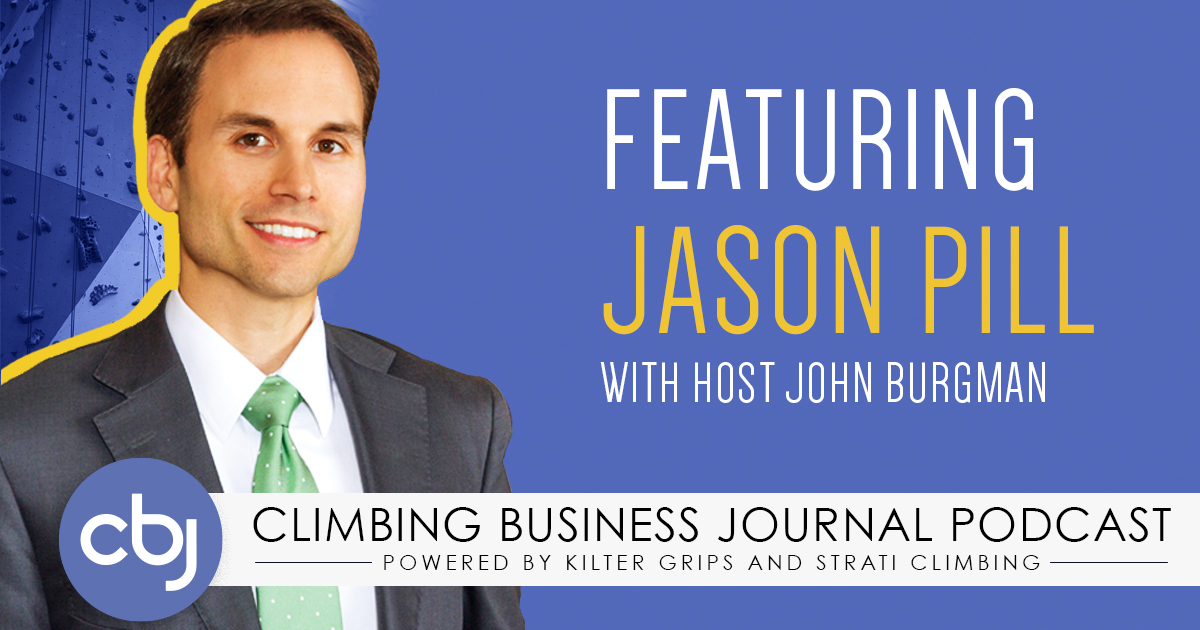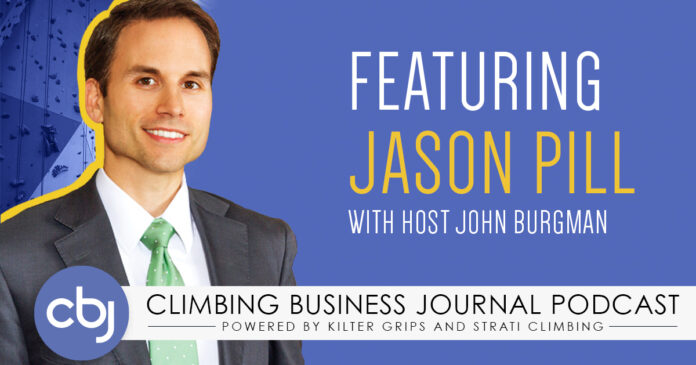
Today’s episode features a conversation with attorney Jason Pill. Jason is a longtime climber, and he currently works with the Phelps Dunbar law firm in Tampa, Florida. His main areas of focus tend to be labor and employment law, but he’s written articles for CBJ on a wide range of legal topics, including an entire Ask a Lawyer series. In this episode, Jason shares some insights about waivers and how protective they really are against lawsuits, some landmark cases and rulings that gym owners should know about, and legal challenges that gym owners might be facing in the years to come.
Thank you Kilter Grips and Strati Climbing for your support!
And thank you Devin Dabney for your music!
Timestamps
00:00 – Intro
02:57 – Climbing and law as career paths
05:45 – Jason’s role at USAC
06:45 – Evolution of the legal side of climbing gyms
09:32 – Legal issues facing gym owners in the coming years
19:17 – Data privacy rights
25:17 – How airtight are waivers?
31:08 – Types of gyms that pose more risk
38:45 – Imputing liability
44:26 – Landmark cases in climbing gyms
54:54 – Recommendations for education
1:00:47 – Where you can find Jason’s work
1:04:10 – Closing
Abridged Transcript
BURGMAN: How has the legal aspect of climbing or climbing gyms evolved since you have been a part of the climbing world?
PILL: So I would certainly say what’s been most pronounced is just the increased sophistication level, like the [user] interface and all the apps that manage our accounts…That level of technology and sophistication was not present when I started climbing in the late ’90s. The gyms were there, but they were more disparate back then. They were smaller operations for the most part. Obviously there are outliers, but really you’ve seen more of a shift towards some of the corporate formalities and the gyms just looking to expand a lot more. Back then, it was much rarer to find these large gym systems of 5, 10, 20-plus gyms in some instances. So I think the proliferation of the sport has brought more capital into the sport and more investment, which has got its pros and cons. And I’m sure you could ask ten people and get ten different views very quickly on that, but I think you’re just seeing a lot more sophistication.
And also because there is more money coming into the industry itself and the business of climbing, you’re seeing more exposure risks. Climbing gyms all of a sudden are attractive targets for folks if they’re looking to file a lawsuit. Before, it might have been a small gym in an abandoned warehouse plaza, which didn’t really look like a very lucrative target for litigation, so it probably made gyms a little safer. But now that they’re becoming these big, sleek buildings with all the amenities and they have a lot more revenue coming in, it does make them a little more of a target in the legal sense, whether it’s personal injury lawsuits, employment lawsuits, and a lot of variations on that…
Looking ahead, what are some of the biggest legal challenges or legal issues facing gym owners in the coming years?
I think there are three categories of risk that I see a little more frequently…The climbing industry’s not especially unique, but it does have its own challenges that are present, and certainly one of the biggest exposure risks for climbing gyms has been and will continue to be negligence cases, injuries, and anything associated with a bad accident at a gym…
Second, the challenges in the workplace and by that, more specifically, the workforce…As you get larger and you get more diverse thought in the gym, as you get a larger base of people, you’re going to get diverse viewpoints. And so naturally that can create some friction. And from a more legal perspective, there’s just a lot of challenges that come with that. As climbing gyms grow, they legally become bound by more statutes and regulations. For example, certain statutes at the federal level don’t kick in until you have at least 15 employees…
And then the third and final category I’ll say is data privacy. And this is something that’s impacting all companies, certainly larger ones, but smaller ones as well, because every company has some volume of sensitive data that it is keeping. At a minimum, a climbing gym is keeping data on its employees….We’re seeing a lot more regulation coming in at the privacy space, and I know that’s not an area that most gyms historically have thought much about. But we’re seeing it impacting every company because every company is keeping some quantum of data or sensitive information that they need to think about how they’re managing and how they’re protecting…

Related to the gathering of data, I want to go back to something you said a little bit ago when you were talking about waivers and how gyms can still be sued even if people do sign the waiver. Can you speak a little more about that? How airtight are these waivers?
…There’s certainly a lot of protections that a waiver can provide, but it is not foolproof, and it is not beyond reproach criticism…It will vary by state, but a lot of states will carve out either willful negligence or gross negligence or what we would call this more egregious conduct. We would consider it more of a basic negligence if a hold was properly installed but it spins and you fall off and you break an ankle. That’s common negligence, and maybe that’s going to be protected by a liability waiver. But once it starts getting into something more egregious where somebody failed to clip in a climber before they belay because they were talking or they were on their cell phone or they weren’t paying attention, or a rope broke because the gym wasn’t properly maintaining it and it just ignored the safety precautions, when you reach what would be considered these more egregious levels of negligence or what would at least be argued to be more egregious, you’re going to have more challenges enforcing that waiver…
And then there might be challenges to the actual incident itself, [with someone] saying, “Sure, your waiver says that I can’t sue you and I’m assuming all risk. But I didn’t think or expect that you would be so negligent that your ropes would be frayed and they would split, or that your auto belays wouldn’t be fully anchored into the wall and would just fall off.” And those are obviously extreme examples, but as you get into that more extreme conduct, you run a greater risk…

Are there any types of gyms that, in your opinion, pose more or less risk of accidents, negligence, than other types of gyms?
At the risk of sounding reductive and maybe even a little crass, the higher you go the higher the risk. So, if you are doing a boulder-only gym, you are at least reducing the likelihood of more catastrophic injuries. With anyone who has bouldered before, there are tweaked shoulders or sprained ankles or broken wrists if you fall awkwardly. Certainly there are a lot of risks with bouldering and depending on how you land. But the real risks and where you see more issues are when folks naturally go to higher heights and if somebody falls from 15, 20, 25, 30 feet plus whatever it may be. Once you start allowing sport climbing, if you know you’ve got some folks taking some bad whips, those are some areas where you might see a little more injury…
One of the things to be mindful of from a legal perspective is trying to increase the safety wherever you can—being mindful of how you are setting routes and talking to your routesetters and saying, “Look, if there’s a dangerous move, let’s try to get it in the middle of the route where someone’s four or five clips in at that point, not when they’re at the first clip and they might deck.” There are little things like that you can think about that may compromise some of the routesetting slightly but should be geared toward safety. And that’s just a good goal to have anyways, because the gym doesn’t want any other people getting hurt, legal liability or otherwise…
Are there any landmark cases related to climbing gyms or related to employment that could pertain to a climbing gym? Any landmark cases that people working in a gym should know about?
It’s interesting because as we see more litigation in the climbing industry, it does appear that a lot of those cases get settled. They don’t necessarily go to trial. They don’t even go to summary judgment, which is like a trial on the papers, so to speak. But what that means is we don’t get as many rulings in these cases in the climbing industry, so really we look at other cases that are industry agnostic that could impact the climbing industry because these laws apply to climbing gyms…
One I wanted to point out, because I think it’s especially relevant and it’s somewhat related in the sports context, is the U.S. Women’s Soccer Team—the lawsuit brought by the Women’s National Soccer Team showing issues with equal pay compared to their male counterparts. And it was quite a lengthy litigation, but in August of 2022 they finally reached a settlement in that suit. It was a $24 million settlement, so it was a very massive amount and pretty record breaking in many ways. At the heart of that dispute was the simple premise that these female athletes who were exceeding at a world-class level and literally being the best in the world were not being paid as much as their male counterparts.
And the reason that’s relevant to any industry and certainly the climbing industry is just that reminder to keep that focus on gender equality and pay equality. And not just because it’s the right thing to do or it’s very progressive or altruistic, but because it’s the law and we have the Equal Pay Act and it’s been around for a long time. So it’s not some new trendy thing that you may have missed; equal pay has been around for decades…If you’re having issues of unequal pay, it is absolutely toxic to a workplace. It will poison your workforce extremely quickly…So it’s just a reminder to keep an eye on your salaries and your compensation…

If somebody is listening to this episode and has been maybe inspired to do more research on their own to become more legally minded or better educated when it comes to the legal aspect of owning or operating their gym, what would you recommend they do?
…At the most basic level, I would say get an attorney that you’re comfortable with—one who knows your business, knows the industry, and knows your geographic locale if possible…You don’t need to use that attorney all the time, but you need to have that resource there because you don’t want to wait until there is a problem…
If you’re doing any research for legal compliance reasons, I also recommend you track it. And you don’t need a detailed log of everything you did or how many minutes you spent listening to this or watching that, but generally track that because some of these statutes that we talk about, like wage and hour statutes, they do have certain increased damages that apply if something was done in bad faith or in the absence of good faith. And the inverse of that, and why it’s important to hear, is that you can actually argue a defensive good faith, saying, “I tried to comply, so my damages should not be so severe…”
Note: This column offers general advice and is not intended to be used as direct legal counsel. Gym owners should consult a lawyer for their facility’s specific legal matters. Pill can be contacted directly here.

John Burgman is the author of High Drama, a book that chronicles the history of American competition climbing. He is a Fulbright journalism grant recipient and a former magazine editor. He holds a master’s degree from New York University and bachelor’s degree from Miami University. In addition to writing, he coaches a youth bouldering team. Follow him on Twitter @John_Burgman and Instagram @jbclimbs. Read our interview Meet John Burgman, U.S. Comp Climbing’s Top Journalist.









